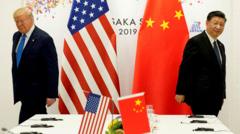In the wake of President Trump’s announcement regarding new import tariffs, US stock markets experienced their largest decline since the onset of Covid-19, with major indices shedding billions.
Trump’s Tariff Strategy Leads to Stocks Plunge as Global Tensions Rise

Trump’s Tariff Strategy Leads to Stocks Plunge as Global Tensions Rise
Markets tumble after tariffs imposed by Trump prompt concerns about economic impacts and retaliatory measures from global partners.
Global stocks faced a sharp downturn following President Trump’s imposition of new tariffs designed to protect American companies and reinvigorate domestic manufacturing. The S&P 500 index fell by 4.8%, representing its most significant drop since the pandemic first gripped the global economy in 2020. Major companies such as Nike, Apple, and Target were particularly affected, seeing declines of over 9%. Trump's tariffs, proposed at a minimum of 10%, particularly target imports from China, which is facing an aggregate tariff of 54%, as well as the European Union, which is encountering a 20% levy.
At a press conference at the White House, President Trump reiterated his belief that the US economy would "boom" as a result of these tariffs. He explained that the additional revenue generated would be used to bolster federal funds and encourage American manufacturing. However, concerns are mounting globally as both China and the EU have vowed to retaliate, which could escalate into a full-fledged trade war.
The World Trade Organization expressed deep alarm, suggesting that these tariffs could potentially lead to a 1% contraction in trade volumes for the year. Analysts warn that the tariffs are likely to contribute to inflation and may stall economic growth. Following the announcement, the S&P 500 lost approximately $2 trillion, with the Dow Jones and Nasdaq also experiencing significant declines.
Investor sentiment has shifted dramatically, as evidenced by the financial markets’ poor performance across the globe, including a 1.5% fall in the UK's FTSE 100 and declines in European markets that mirrored movements in Asia. Companies are left grappling with the need to either absorb the increased costs of tariffs or pass them onto consumers, which poses a risk of reduced sales as consumer spending is essential to the global economy.
In terms of specific industries, manufacturers such as Stellantis announced temporary production halts due to the pressures of the tariffs, affecting employment levels in the US as layoffs were reported for hundreds of workers. The tariffs not only affect American companies but have also sent shockwaves through European markets, where leading sportswear names like Adidas and Puma have witnessed considerable stock price drops.
Market analysts are predicting continued volatility in the coming months as the implications of Trump’s tariffs unfold, with businesses and consumers alike bracing for potential economic strain amid growing trade tensions. The fear of an economic slowdown looms large over the financial landscape, as the situation evolves and companies navigate the uncertain environment created by these new policies.
At a press conference at the White House, President Trump reiterated his belief that the US economy would "boom" as a result of these tariffs. He explained that the additional revenue generated would be used to bolster federal funds and encourage American manufacturing. However, concerns are mounting globally as both China and the EU have vowed to retaliate, which could escalate into a full-fledged trade war.
The World Trade Organization expressed deep alarm, suggesting that these tariffs could potentially lead to a 1% contraction in trade volumes for the year. Analysts warn that the tariffs are likely to contribute to inflation and may stall economic growth. Following the announcement, the S&P 500 lost approximately $2 trillion, with the Dow Jones and Nasdaq also experiencing significant declines.
Investor sentiment has shifted dramatically, as evidenced by the financial markets’ poor performance across the globe, including a 1.5% fall in the UK's FTSE 100 and declines in European markets that mirrored movements in Asia. Companies are left grappling with the need to either absorb the increased costs of tariffs or pass them onto consumers, which poses a risk of reduced sales as consumer spending is essential to the global economy.
In terms of specific industries, manufacturers such as Stellantis announced temporary production halts due to the pressures of the tariffs, affecting employment levels in the US as layoffs were reported for hundreds of workers. The tariffs not only affect American companies but have also sent shockwaves through European markets, where leading sportswear names like Adidas and Puma have witnessed considerable stock price drops.
Market analysts are predicting continued volatility in the coming months as the implications of Trump’s tariffs unfold, with businesses and consumers alike bracing for potential economic strain amid growing trade tensions. The fear of an economic slowdown looms large over the financial landscape, as the situation evolves and companies navigate the uncertain environment created by these new policies.






















